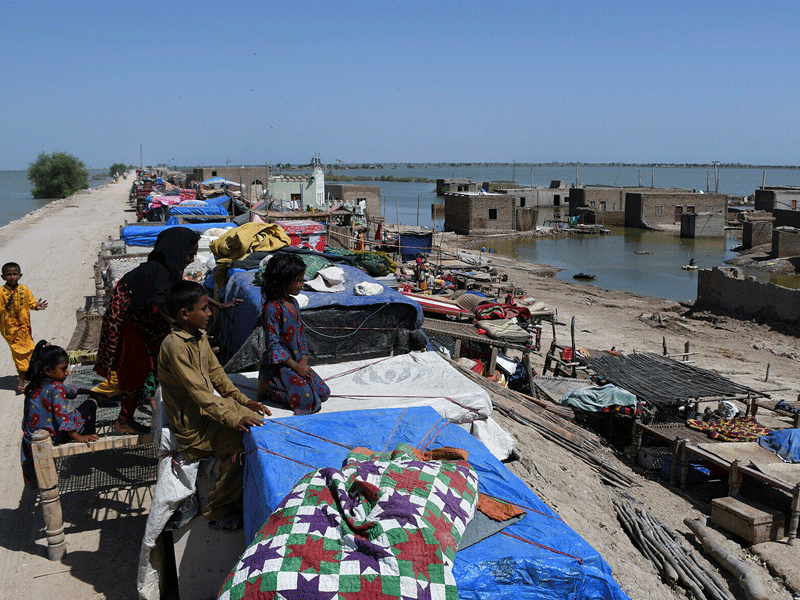Tough days ahead as winter is going to prevail soon

- 294
- 0
Tough days are ahead for the flood victims as the cold weather is fast approaching while the delivery of relief goods is not in accordance with the requirements of the situation. Since the floods were unprecedented in nature, the government cannot alone provide relief to the victims while the aid pledged by international donors is still to arrive in real sense of the word.
In fact, there is a huge gap between the pledges made by international community to help the flood victims and the assistance delivered to Pakistan so far. Contrary to the pledges, the ground reality is that the relief assistance has not reached yet substantially due to which the flood victims have to face a lot of difficulties as majority of them are still living under open sky with little help available to them.
According to the United Nations, the aid promises made by UN member states for relief of flood victims have not yet fully materliasing, and there is a need for accelerating the efforts of delivering goods to the victims. The UN Humanitarian Coordinator in Islamabad was quoted to have said: "We have not yet seen enough funding for health, nutrition and safe water and we are working with those countries that are supporting Pakistan to see more funding in this critical area.
This is absolutely a challenge and there remains a major gap. The situation on the ground is very pathetic an estimated three and half lakh small farmers are facing extreme hardships during the current crop planting season, the provision of seeds and animal fodder for affected households is also a serious issue.
Meanwhile, the National Flood Response Coordination Centre (NFRCC) joint survey report has put the flood damages in billions in 46 districts of Balochistan and Khyber Pakhtunkhwa. The survey report on 22 districts of Sindh, six of Balochistan, and over a dozen of KP districts is still awaited. One would urge the international donors and UN member states to fulfill their pledges and generously donate blankets and quilts for the flood-hit people as the cold weather is upon us. The flood damages are beyond our imagination.
The intensity of the disaster can be gauged from the fact that Sindh has already been declared "calamity-hit" where the wheat crop is going to be less by 30 per cent, while cotton has suffered 45 per cent losses, followed by dates 86 per cent and rice almost 40 per cent. Even the high water-consuming corps like the sugar-cane is badly affected by flash floods.
This declining production patterns is going to result in more food shortage and food price inflation which is a matter of serious concern. The extreme weather pattern i.e., first drought with no water to irrigate the fields and then torrential rains and flash floods within span of six to eight months speak volume of the climate change effects in our country which is basically an agrarian economy.
In this backdrop, the crisis of food shortage is going to worsen in the country. Already the prices of essential kitchen items like onion, tomatoes, potatoes and other vegetables are beyond reach of the common man. Pakistan's current wheat production is projected to be less by more than thirty per cent for next year, posing a serious danger of further aggravating the food shortage issue in the country which is already reeling under the effects of the rupee's depreciation and inflation.
We have been noticing a marked decrease in cultivation area, high prices of fertilizers, and the water issues in the country and now with the flash floods, the situation is totally out of control. Some months back the country was facing a drought-like situation and experts said that water issues are serious because our country either does not have enough water to meet the irrigation needs or is faced with the danger of flash floods like the current situation due to which our standing crops are facing the danger of flash floods due to heavy deluges of water from the over flowing rivers and dams. It is pertinent to be mentioned here that the Pakistan Economic Survey (PES) 2021-22 has also pointed to the wheat and other food grains crisis in the country due to the low production of wheat and damage by flash floods for the next year.
The wheat production forecast is said to be at around 27 million tonnes, which means 4.5% less production as compared to that of last year.
The irony is that wheat is our staple food and sixty per cent of our food intake consists of wheat flour. The federal government had also announced Rs1 million compensation amount, and as such the government should fulfill the pledge as the delay would affect the flood victims. As a matter of fact, that the flood of biblical proportions has wreaked havoc with our infrastructure. An estimated 33 million people are affected by the catastrophe.
The life loss due to floods is said to be over twelve hundred people, but the unfortunate thing is people are still dying due to floods-related catastrophe due to the spread of water-borne and vector-borne diseases in flood damaged areas. The heart-wrenching stories of the flood affectees circulate on the social media even after four months of the floods in the country which indicates that though water has started receding in some areas but the disease onslaught in these areas is very colossal, taking toll on the lives of the flood victims who are living in make-shift arrangements under open sky.
An estimated 1.8 million houses have been fully destroyed houses while more than two million acres of land is still inundated by water and it is a big challenge in the current crop season.
Published in The Daily National Courier, October, 19 2022
Like Business on Facebook, follow @DailyNCourier on Twitter to stay informed and join in the conversation.

















































